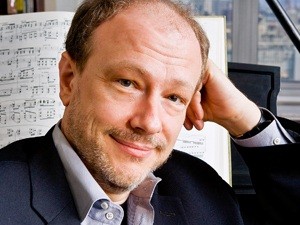|
Back
Mr. Anderson’s Amorphous Heaven New York
Avery Fisher Hall, Lincoln Center
04/24/2014 - & April 25, 26, 2014
Julian Anderson: The Discovery of Heaven (American Premiere)
César Franck: Variations symphoniques
Sergei Prokofiev: Selections from Romeo and Juliet, opus 64
Marc-André Hamelin (Piano)
New York Philharmonic Orchestra, Sir Andrew Davis (Conductor)

M.-A. Hamelin (© Fran Kaufman)
Sir Andrew Davis stepped up to the podium, opened the score to César Franck’s Symphonic Variations, cued in the New York Philharmonic, the soloist took the seat at the piano...
...and the great Alicia de Larrocha began to play.
What??? Alicia de Larrocha? But isn’t she...hasn’t she graduated to entertaining God these days?
Actually, that opening paragraph was about an event that happened exactly 30 years ago, with the exact same orchestra and the same conductor as last night. Coincidence or not, this is the first time that the César Franck Symphonic Variations have been performed since Sir Andrew took the stand in 1984.
The soloist last night was evidently not the late great Ms. de Larrocha. It was the redoubtable Marc-André Hamelin, who obviously would be able to toss this gem off in short order. Whatever grace, and loveliness that Ms. de Larrocha might have given it three decades ago, Marc-André Hamelin evidently thought it was a delicious piece of birthday cake. He cut through the opening improvisatory themes, launched into the main set of variations with whirling rapidity, paid little attention to the remarkable change of keys, and offered the finale with all the required brio and brilliance.
In a certain way, Mr. Hamelin resembles a 19th Century pianist. He plays everything with incomparable skill. He can improvise, compose, saunter through pieces like the Franck, play the most enchanting Gershwin and take on Beethoven. All with the same aplomb, the same perfection.
One looks for, even hopes, for those selfsame minuscule flaws which a great diamond should have. But nothing bothers him. Mr. Hamelin played the Variations without breaking a sweat. It was typical Hamelin fearlessness, the kind of playing which indicated that a man of his stature probably didn’t need to rehearse or practice. True, at times he plunged a bit ahead of Sir Andrew on the dais, but he immediately backed into line, as if to show that he could do what he wanted.
It was a good piece, Mr. Hamelin was wonderful, the entire event was one of charm. Perhaps ephemeral charm, and perhaps some of us wanted a bit more effort from such a faultless artist. But that is not the Hamelin way. And we could still be happy that he is around as Mr. SuperKeyboard.
Nothing was ephemerical about the opening American premiere by the British composer Julian Anderson, co-commissioned by the New York and Philharmonics. Despite the title, The Discovery of Heaven was not a mystical journey into the unknown. It comes from an outrageous Dutch time-travel novel, along with some Japanese feelings in the background. Specifically the Etenraku, “heaven-based” music from gagkaku court music.
Mr. Anderson claims that the he isn’t trying to produce Japanese music in the 15-minute piece. But one can hear certain influences–the opening shaded flute solo, the whacking beats on the drum, a certain stateliness in the opening section. Yet in looking for this, one may have missed enchantments of the music itself.
On the one hand, Mr. Anderson jiggles and juggles his orchestra every which way. The first of the three sections–and the last measures–have no ending at all. They waver, begin a measure, suddenly break off. The atoms of orchestration are like atoms in osmosis, sometimes bumping against each other, sometimes fading into themselves, sometimes avoiding each other. Mr. Anderson handles his orchestra like a George Seurat on a canvas, pointedly drawing points of light which may make up a whole picture...or may not.
The second section is more in unison, it includes trumpet calls and strange but easily accessible colors, bass instruments playing together, solo tweets, enough percussion. It seems to be going somewhere, then it stops and then when it seems to make a final cadence...
Well, there isn’t any cadence at all. For like the beginning, like the osmotic atoms, we are left in suspension. Perhaps that suspension itself is the discovery of heaven, that we’re always on the verge of the Ideal, but we’ll never find it.
Or perhaps that’s simply a personal comment. Mr. Anderson, who has studied much with the “Spectralists” obviously would be insulted to be classified with any group. He has written this eccentric assemblage of beautiful things for their own sake. And he certainly knew what he was doing.
The last half was devoted to nine sections of a work which is not only the greatest classical ballet of the 20th Century, but certainly one of the finest orchestral paintings of the same century. The Philharmonic’s First Chairs were in their element, especially a beautifully subdued violin solo by Sheryl Staples, some fine flute and clarinet playing etc etc. But the real victors were the orchestra under Sir Andrew.
The power of the dances, the grief of Romeo at Juliet’s Tomb, the whiplash excitement of the death of Tybalt. But then we come to a section that has no competitors in the history of music for Shakespeare.
Prokofiev’s “Balcony Scene” may be a bit too mature for its eponymous teenagers, but it gives the absolute lie to Prokofiev being such a prickly sharp composer with little sympathy for deep emotion. This is the apotheosis of both pathos and joy.
Should Shakespeare come back to earth some day, he would snore though Gounod’s Romeo and Juliet, be confused by Berlioz’ Roméo et Juliette. But listening to the “Balcony Scene” here, he might excise his words, and let the music provide all the necessary poetry.
Harry Rolnick
|